Review for Jake Hunter: Detective Chronicles page 2
We should have seen this coming.
When the DS was released way back in 2005, adventure games for the system were few and far between, but the ones that were around were... how should I put this? Brilliant. Not because they were the best adventure games ever made, or were even all that different from games that had been coming out for the PC for years, but because in spite of the scaled-down format, they somehow managed to be fun, novel, stylish, and (*gasp*) appealing to a wider audience than the subset of DS owners who already considered themselves adventure gamers. "How come there aren't more games like this?" I remember people asking, after playing Trace Memory or the first Phoenix Wright. And I remember thinking, wow, this could actually be a turning point. For a little while there, it seemed like the adventure genre might stop being the butt of jokes and could even find a whole new audience, thanks to Nintendo's handheld. What a concept.
I'm sorry to say that with the release of Jake Hunter: Detective Chronicles, the honeymoon is officially over. Not only is this the worst DS game I've had the misfortune of playing, it's one of the worst adventure games I've ever played, period. And coming from someone who loves adventure games and is usually willing to give them a fair amount of leeway, that's saying a lot.
Jake Hunter: Detective Chronicles is a repackaging of Tantei Jinguji Saburo, a noir-inspired crime-solving series that has been kicking around Japan in various formats for twenty years. Last year, a DS version with six cases was released in Japan. Five of those cases were ports of existing content and the sixth was a brand new, DS-exclusive title. Jake Hunter is an English localization of the Japanese DS release, except it only includes the first three cases, none of these being the case that was specifically designed for the DS. But hey, that's okay, right? I mean, most of the Phoenix Wright cases were ports of GBA titles, and those worked out. Which is why I'm not willing to cut this game any slack for being a port. I don't care that it's a port. There's so much more to condemn it for. Like low production values, poor localization, abhorrent writing, and a general lack of this little thing called gameplay.
A Jake Hunter case goes pretty much like this. You start out in your office at the Jake Hunter Detective Agency. Someone comes in and offers you a case. You go to the scene of the crime. At best, you have the options to "inspect," "talk," and "move," which can be selected from the bottom screen using either your stylus or the D-pad and A button. (All of these options aren't always available; it depends on what the game wants you to do next.) When you've found what you are expected to find, a new location might open up. You can "move" there and "inspect" and "talk" some more. At some point you'll return to your office, smoke a cigarette, and call it a day. Then the cycle repeats, until Jake finally has an a-ha! moment and cracks the case.
As in many DS games, locations, character portraits, and text are displayed on the top screen, and the options you can choose from to control Jake's actions are shown on the bottom screen. The gameplay isn't all that different from what you do in the investigation segments of Phoenix Wright (or any adventure game, for that matter), but it's seriously stripped down. For one thing, selecting "inspect" doesn't mean you get to comb the location for clues. Instead you'll be presented with a short list of things you can inspect (i.e. "vicinity," "door," "door handle"). You're not looking for clues in the environment and honing in on them, but choosing from a predetermined list of areas and reading text about each of these areas. Sometimes the text is merely descriptive. Other times, it unlocks a new area for you to inspect or identifies someone you can talk to. For example, inspecting a hotel lobby might cause you to notice that there's a front desk, which adds "front desk" to the list of things you can inspect. Inspecting the front desk clues you in to the presence of a receptionist. Only then does the "talk" option appear, allowing you to engage the receptionist in (minimal) conversation.
Another big limitation is that you can't move around at will. The game won't let you leave for a new location until you've done everything it deems necessary in the current location, even if what you're being forced to do is entirely unnecessary in the grand scheme of the story. More often than not, if you select the "move" option, Jake will say that there's more to do or he's not ready to go, even when it's clear that you've done all you can. (It's not like you get that many options in each location to begin with!) When this happens, you're usually stuck having to talk to a character nearby so Jake can comment about how there's nothing left to do and it's time to leave. Only then will the game let you leave, often forcing you to the next location it wants you in, rather than letting you choose your next step.
The issue of non-interactivity extends farther than this. Even when you are allowed to access your map, there are usually only one or two locations on it. Your meager inventory includes business cards and a cell phone, but you can't use these items preemptively. You have to wait for a conversation to reach an awkward impasse ("He won't talk to me unless I find some way to convince him I'm a detective!") or for the lightbulb to go off over Jake's head ("If only I had some way of reaching the police!") On a couple of occasions, the game does lead you into a more interactive mode, usually involving an action sequence. For example, you're about to be beaten up in an alley. Instead of choosing between "talk to thug #1" and "talk to thug #2" you now get to choose between "dodge," "punch," and "kick." With the exception of a few camera shakes, the action isn't shown on-screen, so these sequences feel detached and ironically less action-packed than they would have if the game had just presented a few descriptive sentences about being jumped in the alley by a couple of thugs.
At several points during a case, you'll be prompted to "think." In the first two cases this typically happens at the end of a day, whereas the third case gives you a little more freedom to exercise Jake's powers of deduction throughout the day. Not that it really matters, since Jake Hunter's version of "thinking" is to present you with a series of mundane questions and multiple choice answers. These sequences seem like they'd be a good way to make connections and put together the pieces of the investigation, but in reality, they're pretty contrived. The game is just testing your memory, and the stakes are low to none. If you get an answer wrong, no problem, simply try again. There's no incentive to get the answers right, and no puzzle solving required to reach an epiphany. This is more like a pop quiz where you're forced to prove you were paying attention to what just happened, before the game will let you proceed to the next scene.
Okay, okay, all this being said, I might be a teensy bit to blame for my own disappointment in the gameplay. When I saw that Jake Hunter was being billed as a "digital novel," I thought, that's just marketing talk. It's how you trick people who think they hate adventure games into trying one, like convincing your kid that prunes are an exotic type of candy. But boy, those marketing guys weren't kidding. In Jake Hunter, ALL you do is read. Under different circumstances, that might not be such a terrible thing, but this is bottom-of-the-barrel prose. The plots are flimsy and cliché (so much so that I won't bore you with any of the details), the characters have zero personality, and the writing is just awful.
To some extent, the poor writing could be blamed on a bad translation, but with so many adventure games coming out of Europe with less-than-stellar localizations, I'm used to translation snafus by now. Even the Phoenix Wright games have their share of cute typos now and then, but Jake Hunter takes localization gaffes to the next level. Along with a slew of errors any half-decent proofreader should have caught, there's a lot of prose that reads like a first draft out of Creative Writing 101. I gazed at the clock intently. The 7:00 of my digital clock flashed back at me. It's [sic] red glow was unrelenting. Poorly translated, or poorly written to begin with? It's hard to tell. My mind was still fuzzy from last night's escapade, and my skull felt like a jackhammer testing facility. I was finally able to retrieve the month-old conversation from the corner of my mind. Ugh. Sure, there are a lot of poorly written video games out there, but since this one is 99.9% reading, the low quality can't be overlooked. Jake Hunter's text is boring at best and downright cringeworthy most of the time. Not a positive selling point for a so-called "digital novel." I suppose it could be argued that the writers were trying for a noir / pulp novel feel and simply went a bit overboard. Even if the tone was intentional, though, that doesn't make the writing good.
With the dual screens' small size, DS games have an advantage over other platforms in that a game can look pretty good with fairly low-key artwork. I wish I could say Jake Hunter excels in this area, but the graphics seem pretty blah to me. Other than a few crusty FMV sequences at the beginning and end of a case, the art is all static. Locations are represented by photo-real graphics, with hand-drawn characters overlaid to show who's speaking. The locations often contain signs with Japanese characters, which would be fine except that the text goes out of its way to try to convince us that the game is set in America. (I found myself yearning for the generic "this country" so often used in Phoenix Wright to avoid this very issue.) The character art is mediocre, not at all stylized or special. The characters' appearances and facial expressions don't change no matter what they're talking about, and their faces aren't all that expressive to begin with. Jake always has a square, clenched jaw; his assistant Yulia is always smiling. The rest of the characters are easy to forget. It's all just so boring, which is a shame, since with the game's noir detective theme, the artists had a well-established visual style they could have drawn from.
Okay, so the gameplay sucks, the writing sucks, the artwork sucks... did they at least score on the music? Nope, sorry. For many locations, the music just didn't seem to convey the right mood, and the loops are so short it becomes repetitive real quick. Because of this, I played most of the game in silence. Every once in a while I'd turn the volume back up to see if a new location had a less grating theme, but I didn't find one single tune in the game that I liked. As with the art, I'd expect the genre to provide plenty to mimic, but the music was not recognizably noir to me.
Perhaps the only thing Jake Hunter has going for it is that it's short. Really short. I finished the first two cases in about an hour each; the third took me two hours, but only because the story was longer (read: more tedious), not because the case was any more compelling or difficult. With a retail price of $19.99, this game is being billed as a budget title, but it's still the shortest DS adventure game out there, and it's not worth the price. Remember, you're only getting half of the game that was released in Japan! Don't get me wrong, I wouldn't have wanted to play the three extra cases even if they had been included, but at least I might have been able to argue it as a good value for players who are more masochistic than I am. Oh well.
It was inevitable that this day would come. In fact, considering it's been just about three years since the first (brilliant) adventure games were released for the DS, we're right on schedule. If history's taught us anything, it's that good games are followed by copycats, and it behooves players to do some research before taking out their wallets. Even then, there's a chance you'll end up with a stinker. And on the bright side, how would we recognize the good games if we didn't have bad ones to compare them to? Jake Hunter: Detective Chronicles may be a terrible game, but this doesn't change the fact that the DS is still an excellent platform for the story-driven games we know and love. It might even turn out to be a good platform for digital novels, as long as "digital novel" doesn't always translate into "terribly written snooze-fest." We DS owners are just going to have to be a bit more selective from here on out.


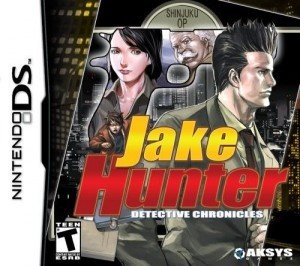
_capsule_fog__medium.png)
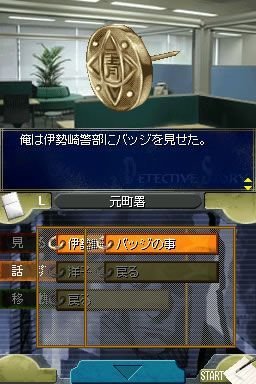




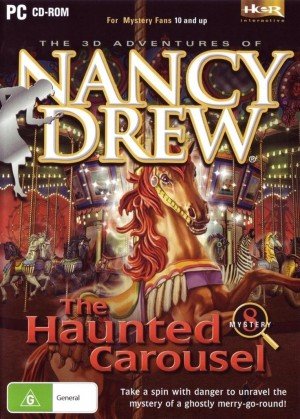
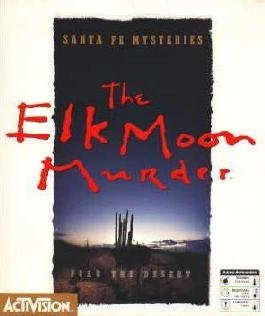
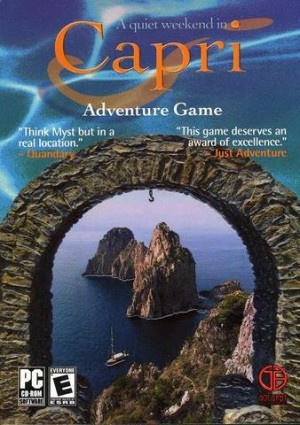
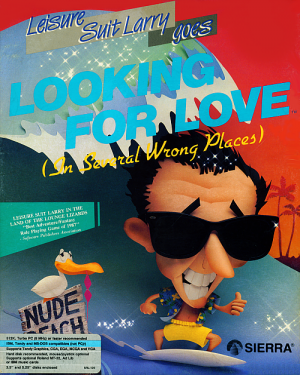
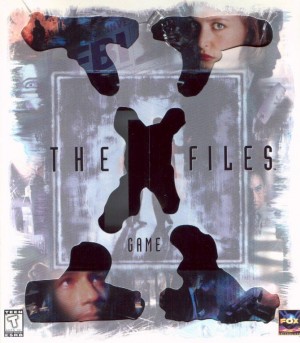
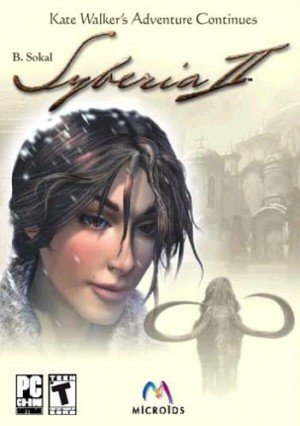
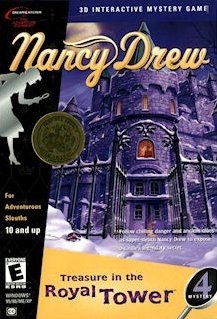
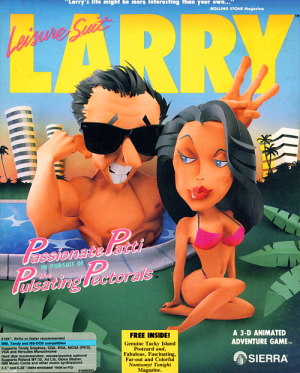
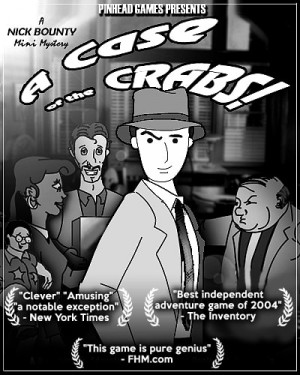
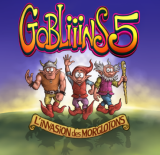



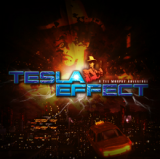



__small.jpg)

